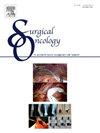Survival outcomes in non-operative cases of localized extremity sarcoma
IF 2.4
4区 医学
Q3 ONCOLOGY
引用次数: 0
Abstract
Background
Soft-tissue sarcomas (STSs) are a diverse group of malignancies challenging to treat when surgery is not an option. The aim of this study was to investigate the survival of non-surgical cases in STSs, and to examine the impact of radiation therapy (RT) on survival within this group of cases.
Methods
Utilizing the SEER database, we conducted a retrospective cohort study of localized extremity non-small round cell sarcoma diagnosed between 2000 and 2019. A total of 444 non-operative cases were identified and analyzed for cancer-specific survival (CSS) and overall survival (OS) using Kaplan-Meier and Cox proportional hazards models.
Results
Among the non-operative cohort, the median age at diagnosis was 72 years. The median survival was 10 months, with AJCC 8th edition clinical stage-specific 5-year CSS rates of 80 % for Stage 1B, 53 % for Stage 2, 47 % for Stage 3A, and 22 % for Stage 3B. The 5-year OS rates were 56 % for Stage 1B, 31 % for Stage 2, 26 % for Stage 3A, and 14 % for Stage 3B. Nearly half of the patients received RT, which was more prevalent in higher clinical stages. RT was associated with improved survival rates for both CSS and OS in patients who are unable to undergo surgical intervention.
Conclusions
RT is associated with improved survival in non-operative localized extremity non-small round cell sarcoma patients. These insights are vital for clinical decision-making, emphasizing the need for personalized, non-surgical interventions to improve outcomes for patients where surgery is not feasible.
局限性肢体肉瘤非手术病例的生存结局。
背景:软组织肉瘤(STSs)是一种多样化的恶性肿瘤,在手术治疗不可行的情况下具有挑战性。本研究的目的是调查STSs非手术病例的生存,并检查放射治疗(RT)对该组病例生存的影响。方法:利用SEER数据库,对2000年至2019年诊断的局限性肢体非小圆细胞肉瘤进行回顾性队列研究。采用Kaplan-Meier和Cox比例风险模型对444例非手术病例进行肿瘤特异性生存(CSS)和总生存(OS)分析。结果:在非手术队列中,诊断时的中位年龄为72岁。中位生存期为10个月,AJCC第8版临床分期特异性5年CSS率为1B期80%,2期53%,3A期47%,3B期22%。5年OS率1B期56%,2期31%,3A期26%,3B期14%。近一半的患者接受了放疗,这在较高的临床阶段更为普遍。对于不能接受手术干预的CSS和OS患者,RT与生存率的提高相关。结论:放疗与非手术性肢体非小圆细胞肉瘤患者生存率的提高有关。这些见解对临床决策至关重要,强调需要个性化的非手术干预措施来改善手术不可行的患者的预后。
本文章由计算机程序翻译,如有差异,请以英文原文为准。
求助全文
约1分钟内获得全文
求助全文
来源期刊

Surgical Oncology-Oxford
医学-外科
CiteScore
4.50
自引率
0.00%
发文量
169
审稿时长
38 days
期刊介绍:
Surgical Oncology is a peer reviewed journal publishing review articles that contribute to the advancement of knowledge in surgical oncology and related fields of interest. Articles represent a spectrum of current technology in oncology research as well as those concerning clinical trials, surgical technique, methods of investigation and patient evaluation. Surgical Oncology publishes comprehensive Reviews that examine individual topics in considerable detail, in addition to editorials and commentaries which focus on selected papers. The journal also publishes special issues which explore topics of interest to surgical oncologists in great detail - outlining recent advancements and providing readers with the most up to date information.
 求助内容:
求助内容: 应助结果提醒方式:
应助结果提醒方式:


